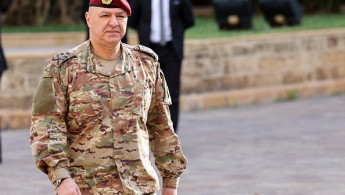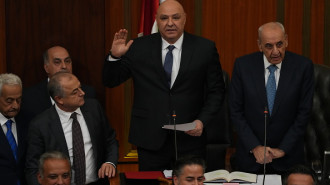Breadcrumb
Who is Joseph Aoun, Lebanon's new president?
After over two years without a head of state, Lebanese lawmakers on Thursday elected a new president for the country, reeling under a crushing economic crisis and the aftermath of a devastating war with Israel which ended in November.
Political turmoil has led to Baabda Palace being vacant since Michel Aoun's term ended in 2022. While Hezbollah and its ally the Amal Movement had clung onto Marada Movement leader Sleiman Frangieh – who withdrew from the race on Wednesday – their rivals had opted for other candidates.
Having a hung parliament with no clear majority for any political alliance, Lebanon's 128 MPs were unable to elect a president for the past two years.
Under the country's parliamentary system, the legislature is tasked with electing the president, who, by convention, must be a Maronite Christian and serve a six-year term.
But now, after clear external pressure to quickly end the political stalemate in Lebanon, parliamentarians finally elected a new head of state in a session on Thursday.
Lebanon's army commander General Joseph Aoun garnered 99 votes, surpassing the 86 votes required.
Who is Joseph Aoun?
The army chief has been widely celebrated in Lebanon for being able to steer the country's military through Lebanon’s unprecedented financial crisis which began in 2019, and the last Israeli offensive which ended with a US-brokered ceasefire deal two months ago.
Aoun – not related to former president Michel Aoun – succeeded in gathering international support for the army, keeping it going as Lebanon has undergone some of its worst catastrophes in recent years.
The army, despite being largely underequipped, has long been considered a symbol of national unity in the country, which suffers from deep sectarian and political divisions.
Born on 10 October 1964 in Sin el-Fil, an eastern suburb of Beirut, Aoun's family originally hails from the south Lebanese village of Aishiyeh in the Jezzine district.
He obtained a degree in political science specialising in international affairs, and a university degree in military studies. He joined the army as an officer cadet and was enrolled in the Military College in May 1983, during Lebanon’s Civil War.
Aoun received several promotions before being appointed as commander-in-chief of the army in March 2017.
One of his biggest challenges was leading the army in the fight against militants from the Nusra Front and Islamic State groups in the summer of that year. The militants had been holed up for years along the border with Syria with the conflict raging there.
They were expelled after a joint operation by the Lebanese army and Hezbollah.
Aoun's mandate as commander in chief was renewed for the second time on 28 November, a day after the Israel-Hezbollah war ended and when Berri called for Thursday's election session.
The decision to extend his mandate was opposed by the Free Patriotic Movement, which has had tense relations with the general for years. Hezbollah, the FPM’s former ally, agreed to extend Aoun’s term after refusing the first time.
Growing support
While Aoun’s name had been circulated as a potential presidential candidate since 2022, most political parties had lobbied for other candidates, among them Hezbollah-ally Suleiman Frangieh, former IMF official Jihad Azour, Independence Movement leader Michel Mouawad, General Security chief Elias Baysari, and others.
Following the last war with Israel, and with the Lebanese military’s crucial role in implementing the ceasefire deal, particularly in light of the weakening of Hezbollah, some politicians have argued that only a military man will be fit for the job in the coming transitional period.
Aoun now is the fourth army general to become president since the late 1990s, after Emile Lahoud, Michel Sleiman, and Michel Aoun.
Constitutional violation?
Electing the current army commander as president would require a constitutional amendment as the country's constitution prohibits public servants, including members of the military, from running for or assuming political office while still in service.
But constitutional expert Saeed Malek told The New Arab's Arabic sister site Al-Araby Al-Jadeed, that even without an amendment, General Aoun can still be elected president.
In order for the election to be stopped, 43 MPs would have to use their right to appeal the election to the Constitutional Council within 24 hours of the vote ending in parliament, and this was unlikely to happen.
In 2008, constitutional prohibitions were dropped to elect Michel Sleiman as president following a consensus reached in Doha among Lebanon's rival parties, which ended a week of deadly armed clashes in and around Beirut sparked by Hezbollah, Amal and some of their allies.
"It is true that electing Aoun without a constitutional amendment represents a constitutional violation, but in order for this measure [his election] to be declared, we would need a decision issued by the Constitutional Council," said Malek.
Amid these exceptional times in Lebanon, nobody is expected to appeal the vote.
Many Lebanese however have decried the constitutional violation, and some reform MPs have said they will not vote for Aoun.
Other reform MPs have said the country’s long-time ruling and corrupt political class have given them no choice, saying Aoun's election was needed for Lebanon to begin its recovery, with no clear agreement on any other candidate.





![Anthony Blinken speech [Getty] Anthony Blinken speech [Getty]](/sites/default/files/styles/image_684x385/public/media/images/6263436E-8ACD-4D3C-9055-25A7BE79DD5A.jpg?h=d1cb525d&itok=fLHmHCRG)
 Follow the Middle East's top stories in English at The New Arab on Google News
Follow the Middle East's top stories in English at The New Arab on Google News
![Italy FM Tajani [Getty]](/sites/default/files/styles/image_330x185/public/2192496012.jpeg?h=a5f2f23a&itok=W1iS7P4X)
![Netanyahu Poland [Getty]](/sites/default/files/styles/image_330x185/public/170439222.jpeg?h=1b74d219&itok=McpHPUUz)
